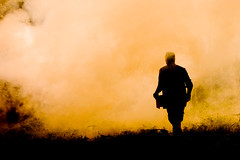 Note: This post contains a single obscenity used in quotation.
Note: This post contains a single obscenity used in quotation.Here's an interesting question to ask of your favorite sort of story: What is this genre for? What purpose does it serve? Horror seems to aim for at least two things, namely to prompt audiences toward an oxymoronic delight in terror and to show them the things they ought to fear. The former goal is the stuff that makes people pick up a paperback or buy a movie ticket; too much of it, though, turns a story pornographic. The latter is the didactic material that makes people mull over the nature of existence itself; an overabundance here can make a tale dry and dull, while emphasizing wrong or inappropriate ideas can cloak it in irrelevance. Such things were very much on my mind as I watched Frank Darabont's big-screen adaptation of The Mist, originally an eighties-era Stephen King novella.
The plot of The Mist is classic high-concept genre. After a violent thunderstorm damages his lakefront home, artist David Drayton drives into town with his eight-year-old son to buy groceries. No sooner have they begun filling their shopping cart than a mysterious mist envelopes the store and a bleeding man runs in screaming that bloodthirsty things skulk through the murk. A few try to leave. They die horribly. Tensions begin to rise in the store, and soon Drayton starts to wonder if the most fearsome creatures are on the inside of the locked doors.
Okay, remember the two things horror does? Let's start with the first. The Mist goes in pretty heavily for splattery joys. A hapless stock boy gets flayed by giant tentacles, while another brave soul ends up torn in half. Spiders burst en masse from mummified victims. Sprays of acidic silk strip off skin in great sheets. A captive takes a butcher knife to the gut with predictably gory results. As for the ending ... well, let's talk more about the ending in a moment. Darabont (who directed The Shawshank Redemption) knows how to make an effective movie, but all of this drive-in-theater content begs an obvious question. What does The Mist offer as the reason for such grue? Do the things it says we ought to fear justify the means used to communicate them?
That's the stuff of the second question, and it isn't an idle inquiry. Divorced from higher thought, extremes on the page or screen become titillation for the maladjusted. The Mist isn't that. It offers rationales, tells us the things we ought to fear. Bugs, for one thing, the whole chittering, skittering horde of them. Feckless military scientists, too, because who knows what their peculiar blend of brilliance and belligerence will expose us to. Oh, and don't forget those fundamentalist Christians; they're necessarily stupid and/or insane, don't you know, and need only the flimsiest excuse to start literally sacrificing unbelievers. True, these themes at least reach for higher things, as far as they go. But when your Big Points About Fear range from the quotidian (insects) to the embarrassingly misinformed (fundamentalists), you can't exactly say your story has scaled Mount Profundity.
Then there's still the ending.
Okay, how do I discuss it without spoiling it? Let's say that, in the film's closing moments, a despairing Drayton makes a bad decision -- a very bad decision which turns the previous terrors into something about as frightening as a nursery rhyme. That held some thematic potential, either as a warning against giving in to hopelessness or to instruct about the fallibility of man's judgment. Director Darabount, though, chooses neither. Instead, the ending seems an embodiment James Ellroy's nihilistic noir aphorism: "We're all fucked."
That's a bad message to couch in good craft.
(Picture: CC 2008 by rgmcfadden)


No comments:
Post a Comment